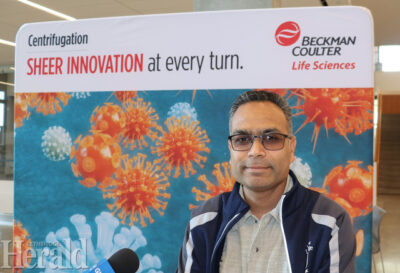Ultracentrifugation symposium hosted at U of L in Canadian debut
By Al Beeber - Lethbridge Herald on July 20, 2022.
 Herald photo by Al Beeber
Trushar Patel talks to media Thursday in the Science Commons building at the University of Lethbridge about an international symposium and workshop staged there this week.
Herald photo by Al Beeber
Trushar Patel talks to media Thursday in the Science Commons building at the University of Lethbridge about an international symposium and workshop staged there this week.LETHBRIDGE HERALDabeeber@lethbridgeherald.com
The Science Commons building at the University of Lethbridge took centre stage at an international symposium held in Canada for the first time.
The International Analytical Ultracentrifugation Workshop and Symposium celebrated its 25th anniversary at the U of L.
The symposium brought about 70 delegates to the city from around the globe while another 30 participated online due to COVID-19 restrictions in their home countries.
Trushar Patel, a research chair and associate professor at the U of L, said Thursday he lobbied to get the conference here in 2017 but due to the COVID-19 pandemic, those efforts had to be postponed. The last one was staged in Glasgow, Scotland in 2017, he said. At that time the U of L was constructing the Science Commons building so he thought he would try to organize the conference here in 2019 or ’20 but it had to be postponed.
“The new building was certainly one of the big features to attract this conference here in Lethbridge because we offer several teaching spaces, workshops, we also have one of the leading researchers in the world, Dr. Borries Demeler, who has three of those analytical centrifuges in our building upstairs on the ninth floor. So we could bring all these participants here to show them our capacity, our infrastructure, our strengths,” and train them, he said.
Patel, on the U of L directory, is described as “an emerging leader in the biophysical characterization of viral nucleic acids-human protein complexes that are at the heart of viral infections. His research focus is to obtain detailed insights into how viral nucleic acids interact with host proteins by employing interdisciplinary approaches.”
Patel started his career at the U of L as an independent researcher in 2016. He has published 79 peer-reviewed articles and is an editor of the European Biophysics Journal.
Fellow Lethbridge delegate Demeler, a professor of chemistry and biochemistry, uses tools including analytical ultracentrifugation and dynamic light scattering in his research.
Patel said Thursday the symposium “is based on one of the key biophysical matters people use to study how pure the anti-body sample is, or how pure the therapeutic treatment molecules are. So we use in the field this matter to study the purity of these samples that can be used for drug development, drug treatment…”
“All of these molecules can be studied using this technique analytical ultracentrifuge,” Patel said.
Being the first Canadian site for the conference “is a great achievement for the University of Lethbridge because although we are not as big as other universities in the country, we are always pushing above our weight and this is one of the examples,” said Patel.
Delegates came from countries such as the U.S., Japan, Switzerland, England and Germany, the professor said.
Because of COVID restrictions elsewhere and the need for some to attend via Zoom, Patel said the conference and workshops are hybrid events.
He said analytical centrifugation has a role to play in vaccine development.
He said the technique can be used for characterization “so if some people are developing liquid nano-particle-based vaccines, we want to find out when you take this liquid nano-particle and you take the RNA molecules which are vaccine molecules, are they talking to each other are not? Are these liquid nanoparticles filled with vaccine molecules? ….The nano particles are the vehicle and the actual vaccine material is the RNA. And before we inject you, we want to make sure that these nano-particles are loaded with RNA and not empty,” Patel said.
“So this is one of the examples that is huge for the application of this matter. We work with viral RNA molecules and we want to make sure before we do any further experiments, these RNA molecules are the therapeutic proteins, they’re developing in the lab are pure, they’re clean and they behave well before actually going on hardcore lengthy experiments.
Follow @albeebHerald on Twitter
19-18




